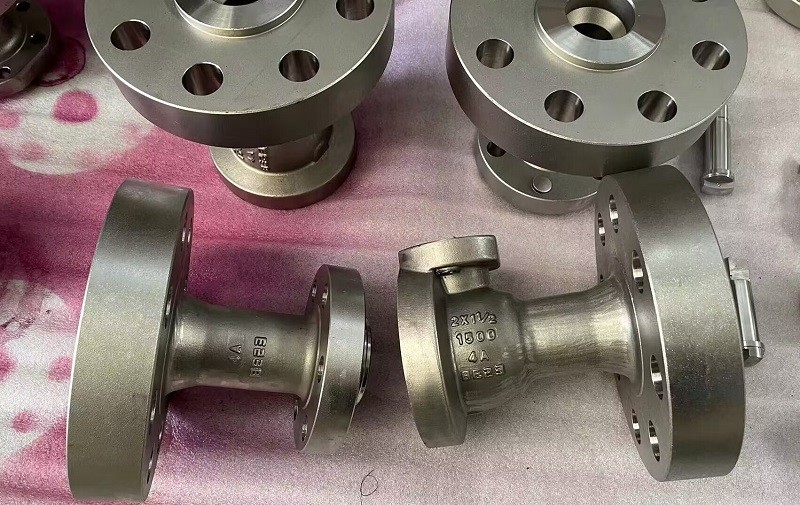Duplex steel is a type of stainless steel that consists of a combination of austenite and ferrite phases in its microstructure. It typically contains a high content of chromium (around 20-28%) and nickel (4.5-8%) to provide corrosion resistance. The inclusion of both phases gives duplex steel its unique properties, including high strength, good weldability, and excellent resistance to stress corrosion cracking and pitting. Other elements like molybdenum, nitrogen, and sometimes copper can also be present in varying amounts to enhance specific characteristics. Overall, duplex steel is widely used in various industries, such as oil and gas, chemical processing, marine, and structural applications.
Duplex steel valves are a type of valve made from duplex stainless steel. The composition of a mixture of austenite and ferrite gives duplex steel excellent strength and resistance to stress corrosion cracking. These valves are commonly used in industries such as oil and gas, petrochemical, and chemical, where they need to withstand harsh and corrosive environments. Duplex steel valves are known for their high performance, durability, and resistance to pitting and crevice corrosion. They are often preferred in applications where regular stainless steel valves may not provide sufficient corrosion resistance.
What are Common Duple Steel Material?
Common duplex steel materials include:
1. Duplex 2205(Casting: ASTM A890 4A Forging: ASTM A182 F51): This is the most widely used duplex stainless steel, consisting of approximately equal parts of austenite and ferrite. It offers excellent corrosion resistance, high strength, and good weldability.
2. Duplex 2507(Casting: ASTM A890 5A Forging: ASTM A182 F53): Also known as super duplex stainless steel, it contains higher amounts of chromium, molybdenum, and nitrogen compared to Duplex 2205. Duplex 2507 offers enhanced corrosion resistance, particularly in harsh environments.
3. Duplex 2304: This is a lean duplex stainless steel with a lower alloy content compared to Duplex 2205. It provides good corrosion resistance, high strength, and cost-effectiveness, making it suitable for various applications.
4. Duplex LDX 2101: This is another lean duplex stainless steel with a low nickel content. It offers good resistance to localized corrosion, high strength, and excellent formability.
What Are The Advantages of Duplex Steel Valves?
Duplex steel valves offer several advantages compared to other types of valves. Here are a few key benefits:
1. Corrosion resistance: Duplex steel is known for its excellent resistance to corrosion, making these valves highly suitable for applications in harsh environments, such as offshore drilling rigs or chemical plants. They can withstand the attack of corrosive substances like acids, chlorides, and seawater.
2. High strength: Duplex steel valves possess higher strength compared to many other valve materials, allowing them to handle high pressure and temperature conditions. This strength is especially beneficial in applications that require reliable performance and durability.
3. Improved fatigue resistance: These valves exhibit improved resistance to fatigue, which means they can withstand cyclic stress and pressure fluctuations without premature failure. This makes them suitable for applications with frequent or rapid changes in pressure or temperature.
4. Cost-effectiveness: While duplex steel valves may have a higher initial cost compared to some other valve materials, they can provide long-term cost savings due to their durability and extended service life. Their corrosion resistance reduces the need for frequent replacements or maintenance, resulting in lower overall operational costs.
5. Versatility: Duplex steel valves are versatile and can be used in various industries and applications, including oil and gas, chemical processing, pulp and paper, desalination, and more. Their wide range of compatibility makes them a popular choice for many different fluid-handling systems.
It's worth noting that the specific advantages of duplex steel valves may vary depending on the particular composition and grade of the steel used, as well as the specific application requirements.
Is Duplex Steel Valve Expensive?
Yes, duplex steel valves can be more expensive compared to valves made from other materials. Duplex steel is known for its excellent mechanical properties, including high strength, corrosion resistance, and resistance to stress corrosion cracking. These properties make it suitable for demanding applications in industries such as oil and gas, chemical, and maritime. However, the added cost of the material, as well as the more complex manufacturing processes involved, can contribute to the higher price tag of duplex steel valves.

